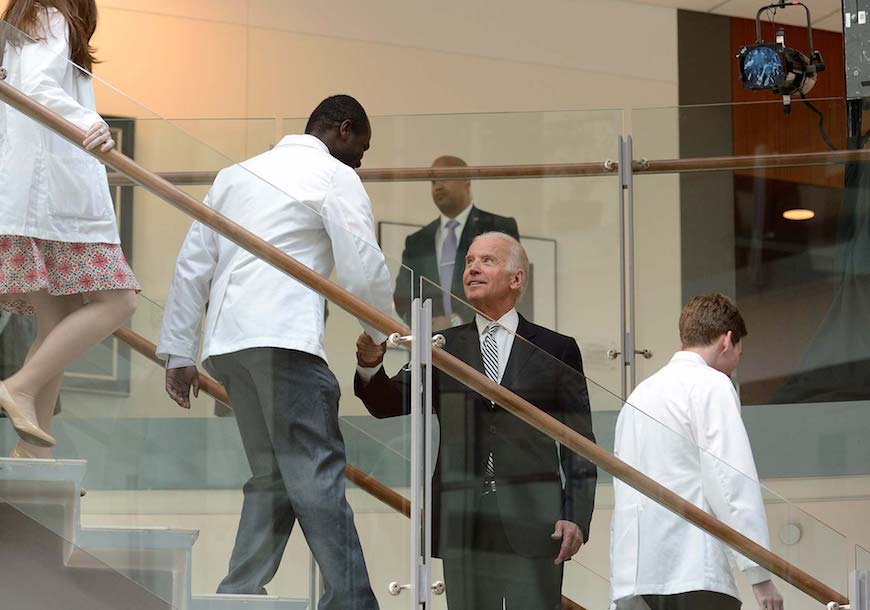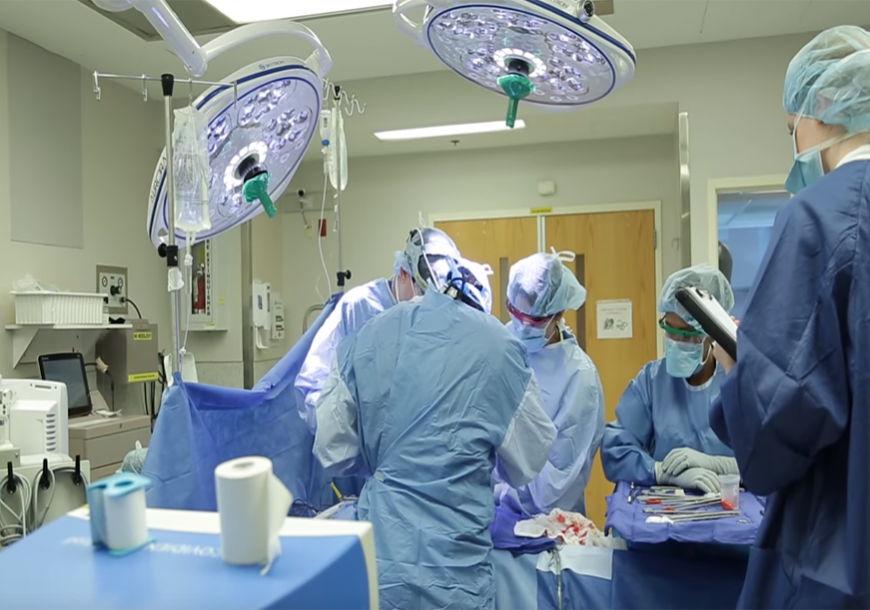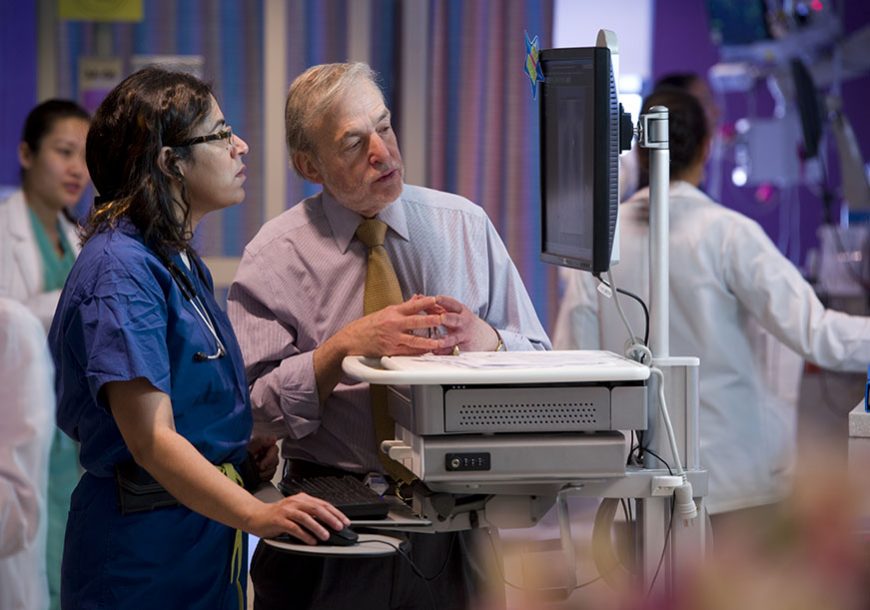Mounting a Massive Attack Against Cancer

Immunotherapy — redirecting patients’ highly individual immune systems to target, detect, and destroy cancer cells — is one of the most promising avenues in the fight against cancer. Johns Hopkins is on the cutting edge of this rapidly advancing approach to treatment, thanks to the pathbreaking work being done at the Bloomberg-Kimmel Institute for Cancer Immunotherapy.
The institute was founded with gifts of $50 million each from alumnus, philanthropist, and three-term New York City Mayor Michael R. Bloomberg, Engr ’64, and Sidney Kimmel, founder of Jones Apparel Group, and an additional $25 million in gifts from other supporters, including Erwin and Stephanie Greenberg, Mary Jo and Brian Rogers, and the State of Maryland.
“The institute is going to perfect new therapies and bring hope to millions of people,” said then Vice President of the United States Joe Biden at the dedication of the institute. “I’m convinced, not only will we save millions of lives, we will re-instill in the American public the notion that anything is possible.”
New Research to Fight the "Invisible" Cancer

Despite its prevalence and toll — it is the fourth most common cancer in men — bladder cancer tends to receive less attention and funding than other cancers.
In 2014, Baltimore-area commercial real estate developer and Kimmel Cancer Center National Advisory Board member, Erwin L. Greenberg, and his wife, Stephanie Cooper Greenberg, a member of the Berman Institute of Bioethics Advisory Council, pledged to change that by directing their $15 million gift toward this single area of immense need.
“Stephanie and I recognize that there are many ways we could focus our resources but wanted to concentrate on one of the least supported cancers,” says Erwin Greenberg. “We’re excited to be part of creating a comprehensive bladder cancer initiative that will bring new resources for patients and could ultimately save thousands of lives.”
“Long considered the ‘invisible cancer,’ the eradication of bladder cancer is our sole mission and purpose,” says David McConkey, MD, the inaugural director of the Greenberg Bladder Cancer Institute.
“We are so very grateful to the Greenbergs for their transformational gift, which already is helping our institute promote discovery, improve patient care and outcomes, and ultimately drive the global field of bladder cancer research closer to a cure.”
Saving Memories

In high school, Ansh Bhammar, A&S ’18, spent his summers playing catch, taking walks, reading, and doing puzzles as a recreational therapy volunteer at a Boston VA hospital. He worked with Alzheimer’s patients, listening to their stories and witnessing firsthand the cognitive effects of their degenerative and fatal diagnosis.
“They wouldn’t remember me or my face, and I would always have the same conversation with the same people,” Bhammar recalls. “They’d be happy to see a new face even though they’ve been seeing me every day for two months.”
Those summers sparked Bhammar’s interest in seniors, and, combined with a long fascination of the human brain, inspired his time as a Johns Hopkins undergraduate student.
As the Albstein Undergraduate Research Scholar in the Krieger School of Arts and Sciences, Bhammar had the opportunity to conduct research with Krieger-Eisenhower Professor of Psychology and Neuroscience Michela Gallagher, PhD, a pioneer in neuroscience who has not only advanced the field through her research, but has mentored young scientists on the importance and rewards of studying it, too.
Bhammar was part of a team investigating how the firing of neurons in the brain is connected to the progression of Alzheimer’s, the sixth leading cause of death in the United States.
“In receiving support from the Phyllis F. Albstein Fund, I’ve really been able to accelerate the pace at which my research project has taken place,” he says.
In addition to receiving support through the fund created by Andy Albstein, A&S ’78, member of the Krieger School Dean’s Advisory Board, Bhammar also benefited from annual fund support as a Woodrow Wilson Undergraduate Research Fellow and through the Ralph S. O’Connor Undergraduate Research Fund, which helped him launch his startup company, an online platform that connects undergraduate students with research opportunities and supports interdisciplinary faculty collaboration.
“I wanted to come to Johns Hopkins because of the focus on research and mostly the focus on taking undergraduate research to the next level,” Bhammar says. “As an undergraduate, it’s been an incredible experience, a truly rewarding journey not just in an academic sense, but to also create and foster lifelong and meaningful relationships with people here.”
Catalyzing Innovative Cancer Immunology Research

Although the field of cancer immunology has advanced rapidly in the past five years, there is hard work left to be done, says one of the country’s leading melanoma experts.
“There are many new immune therapy molecules that, in the lab, look promising, but we need to get them into clinical trials as soon as possible to determine which ones work and don’t work,” says William Sharfman, MD, the inaugural Mary Jo Rogers Professor in Cancer Immunology and Melanoma Research.
Clinical trials carry hefty price tags, so financial support, like that from Mary Jo and Brian Rogers and the Maryland Department of Commerce, is increasingly important, he says. “The funding we’ve received from the Rogers and the State of Maryland allows our scientists and clinicians to work with one another to write more of our own trials based on our own science.”
“The establishment of this professorship is a strong endorsement for the innovative interdisciplinary research necessary to create novel therapies for melanoma patients,” says the university’s vice provost for research, Denis Wirtz, PhD, the Theophilus H. Smoot Professor and director of the Institute for NanoBioTechnology’s Physical Sciences-Oncology Center.
“We are grateful for the continued vision and partnership of Johns Hopkins University trustee Brian Rogers, his wife Mary Jo, and the Maryland Department of Commerce for coming together to create new, and potentially life-saving, therapies,” says Wirtz.